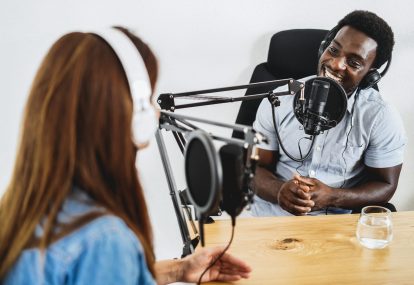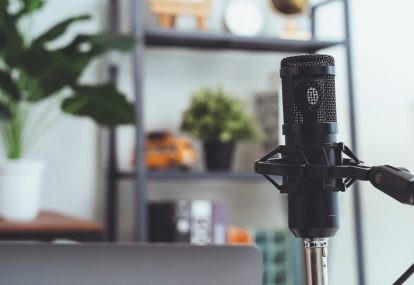Where were you when you first learned about podcasts? That’s a question that few might have an actual answer to. For an invention that isn’t even twenty years old yet, it can be hard to imagine life without it in the year 2023. Whether you love listening to true crime or politics; sports-related podcasts or even one about sleep, know there’s always going to be something for everybody. With that said, join us below as we take a quick stroll down memory lane and examine the many historic landmarks in the evolution of podcasts.
Humble Pre-Beginnings
To start at the time when the word first became gold would be to do it a disservice. In truth, a pre-cursor to podcasts already existed back in the 1980s. The term people used then was “audioblogs,” though it would not set the world on fire until some decades later. Before the internet came along and made short work of the obstacles standing in audioblogs’ way, radio computing services not only provided music, but they also gave talk-related software in digital format to radio stations.
By the mid-90s, early websites began supporting systems for sorting and selecting audio files. These systems included both music and audio subscription services. A notable example of a downloadable audio show from that time is The Dan & Scott Show, which users could avail of through AOL.com. Despite the varied successes of these early innovators, it would take the launching of Napster before downloaded music development would reach a critical mass.
The Word
By the year 2004, the world would forever change with the invention of podcasting as we know it today. Credit to this amazing feat is given to Dave Winer and his co-inventor, Adam Curry. The term started to become commonplace as more and more early podcasters made use of it themselves. As a matter of fact, it was Dave Slusher of Evil Genius Chronicles-fame that made the first documented use of the word in one September episode.
In that same month, Adam Curry himself launched a mailing list just as Slashdot featured a discussion on its site that reached more than a hundred messages. By October, online articles detailing the ins and outs of podcast production were readily available. By the next month, Liberated Syndication launched the world’s first Podcast Service Provider, which proved more than invaluable to the podcasters of the time. Through these exciting new developments, more attention was brought to the fledgling world of podcasting.
By the year 2005, Leo LaPorte makes history by publishing the first ever episode of “This Week in Technology” in April. By June, tech giant Apple proceeds to add podcasting to iTunes, going as far as to build a podcast directory in its music store. In November of the same year, the first Portable Media Expo and Podcasting Conference hosts more than two thousand podcasters, podcast editors, and others. By the end of 2005, the word itself is named by the New Oxford American dictionary as the word of the year and becomes part of the dictionary the following year.
Continued Rise
Steve Jobs kicked off 2006 by telling a live audience how they can make their own podcasts through Apple’s GarageBand software. From there, greater strides came from Lance Anderson a month later, as he went on a live podcasting tour known as “The Lance Anderson Podcast Experiment.” By October of the same year, “This American Life” launched their radio show for the first time in the podcast format. Soon, even Buckingham Palace got in on the action: on Christmas day, Queen Elizabeth’s speech became available for all download via podcast.
In the years that followed, more accolades would come to those getting involved with podcasts. English comedian Ricky Gervais would eventually be acknowledged as setting the Guinness World Record for the most downloaded podcast, having acquired over a quarter of a million downloads for each of his episodes. Eventually, that record would be surpassed by Adam Carolla through his own show, “The Adam Carolla Show,” by achieving 59 million unique downloads. Other thriving comedians and personalities in those early years would include Mac Maron, Walt Flanagan, Bryan Johnson, and Brian Quinn, among others.
Serial
By late 2014, Serial had made its debut. Hosted by Sarah Koenig, the investigative journalism podcast narrated nonfiction stories over multiple episodes. The show was notable for achieving the number one rank on iTunes even before its debut. By April 2015, Serial would win a Peabody Award for its gripping and innovating storytelling format. In addition to this, the show would become the first podcast parodied on Saturday Night Live and would help spawn other shows within the genre of true crime. The coming years would not just see a gradual rise in podcaster afficionados, the number would double in America within just five years.
Podcasting Today and Its Future
By 2019, an estimated 165 million people worldwide had listened to at least one podcast. Spotify managed to acquire Gimlet Media that same year, then bought The Ringer a year later. If that wasn’t enough, they even managed to sign an exclusive partnership with none other than Joe Rogan, whose YouTube channel managed to accumulate two billion total views and boasts 8.5 million subscribers. Although podcasting has always been about those independent creators, with their own small teams that include a podcast editor and a podcast engineer, among others, it is looking more likely that major media conglomerates will continue to establish a foothold on a still-growing niche.




